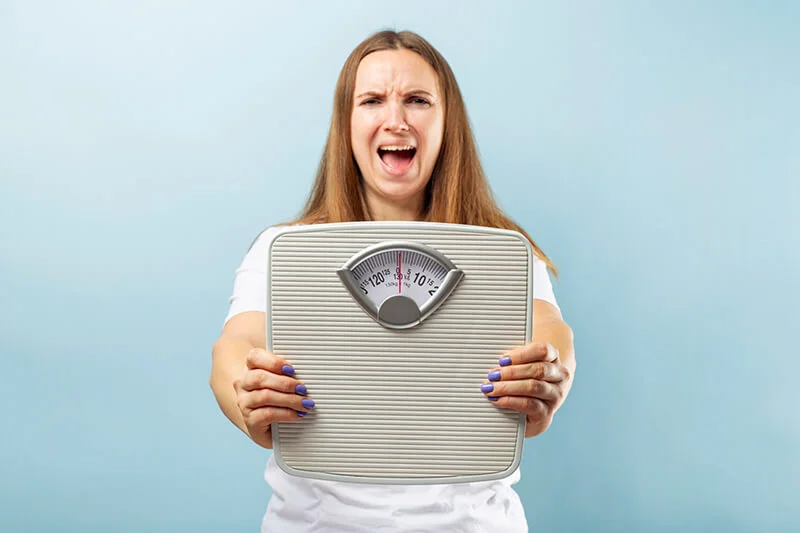Many people want to lose weight quickly with the help of a diet. For example, for health reasons or because they want to fit into their favourite jeans again. Most people who want to lose weight are chasing after a socially defined ideal of beauty that lies in the unattainable distance. Especially if you want to do it quickly. This is because the usual weight loss diets almost never lead to long-term weight loss. But how can you lose weight effectively and in the long term? We have summarised the most important facts on the subject for you.
Why losing weight quickly is often fail
Rapid weight loss diets fail for various reasons. These are the main causes:
Diets contradict our natural disposition: Your body is genetically designed to store fat for times of hunger (i.e. also during a diet). This means that your metabolism switches to a low flame during a diet in order to maximise the use of the remaining energy and nutrients. It even remains in this mode for a while after a diet. In plain language, this means that your body stores more fat after a diet and with normal portions. This is why diets often lead to the yo-yo effect and we weigh more after a slimming programme than before.
Diets are boring and restrict us too much: If a diet is too unbalanced, it may initially lead to short-term weight loss, but we don’t stick to it. Especially if a diet contains too many prohibitions and doesn’t taste good. Diets that are too restrictive can also lead to food cravings, especially when we are under stress. A diet should therefore not prohibit the eating of all favourite foods and many foods, but should include a varied range of foods.
Diets make your muscles shrink: If a diet provides too few nutrients, your body is no longer adequately supplied. The result: Hardcore diets not only reduce your weight, but also your muscles. This reduces calorie consumption in the body, as your muscles have a significantly higher energy requirement than your fatty tissue. The paradoxical consequence: You gain weight.
You have too high expectations when it comes to losing weight: Many people set themselves unrealistic goals and want to lose a lot of weight very quickly. When losing weight, it is not important to lose as much weight as quickly as possible in the shortest possible time. If you are obese, experts recommend a weight loss of five to ten percent within the next six to twelve months, depending on your initial weight.
Not every diet is equally suitable for every person. If you change your diet on your own with a standard diet that is not tailored to you, you may lack important nutrients. Standard diets do not take into account personal likes and dislikes, intolerances and illnesses. A change in diet should always take into account your individual preferences and your living environment.
What is the difference between a diet and a change in nutrition?
A diet is usually a temporary change in your nutrition aimed at losing weight quickly. A diet can be very restrictive and focus on certain food groups and/or pure calorie counting. Diets can help you lose weight in the short term, but they are not sustainable and are unhealthy and difficult to maintain in the long term. When a diet is ended, weight is almost inevitably gained again. This is because the body has reduced its energy consumption during the diet and the calories required are therefore reduced. If you then consume as many calories as before the diet, you will gain weight.
A change in nutrition is a long-term change in eating habits aimed at a balanced and healthy diet. A change in your nutrition usually involves eating a variety of foods from different food groups in order to obtain all the necessary nutrients and vitamins. The aim of changing your nutrition is to establish eating habits that can be maintained in the long term and lead to better health.
How can I lose weight effectively and in the long term?
The success rate for losing weight depends on many factors. Patience is a very important factor for successful weight loss. Losing weight quickly is rarely successful in the long term, as it puts too much strain on the body and is not sustainable. If you want to lose weight, you should take it slowly and steadily so as not to overstrain your body and to be able to maintain the weight you have achieved. Diets are often too short-term and only focus on pure weight loss instead of promoting long-term changes in nutrition and lifestyle.
The best thing to do is to seek help. A personalised diet plan and a permanent change in your nutrition can help you to lose weight in the long term. Regular exercise is also essential for effective weight loss. Endurance sports such as Nordic walking, swimming or cycling are particularly suitable. But strength training can also help you to boost your metabolism and build muscle – which in turn increases calorie consumption.




